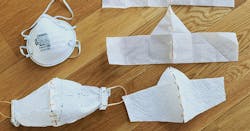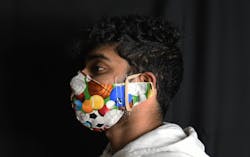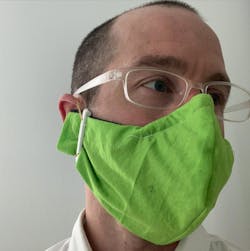COVID-19: CannonDesign initiates industry coalition to make masks for healthcare providers
CannonDesign has formed a new coalition of designers and makers working to create urgently needed protective masks for healthcare workers on the front line of the COVID-19 crisis.
The team is ideating a better do-it-yourself mask that will be able to be produced efficiently to help meet the urgent need. Initial partners include SUNY Buffalo, materialsIn, Oxford Pennant, Stitch Buffalo, and The Factory Buffalo. The toymaker Fisher Price is also supporting the initiative.
Other designers and makers interested in collaborating can reach out via this form.
The team is developing working prototypes. Once the prototypes are developed, these masks can be used by those on the front line of the COVID-19 crisis, or by health workers in lower acuity environments, which would free up the regulated N-95 makes for those on the front lines.
The collaborative team will create these masks through key steps, including:
- Establishing a “patternless-pattern” sewists can replicate efficiently
- Using 3D-printed clips or rubber bands to eliminate elastics or ties from the design
- Connecting experts to makers to share best practices and guidelines
- Building local networks and streamlined paths to get masks from makers to healthcare workers
The coalition expects to ship its first large batch of masks to Evergreen Health Services, Buffalo, by Friday, April 3, 2020. Clinical beta testing will be conducted over the weekend, and the team expects to begin ramping up production starting the week of April 6.
BUT THE QUESTION REMAINS: ARE HOMEMADE MASKS REALLY EFFECTIVE AGAINST CORONAVIRUS?
There is some question whether such homemade face masks actually work—that is, do they really protect healthcare workers, COVID-19 patients, or the public?
CannonDesign Principal Michael Tunkey, AIA, addressed this question in a recent blog in which he acknowledged that the “topline scientific conclusion” is that homemade cloth masks “do very little” to stop the novel cororavirus, and that the “real solution” is to ramp up production of N95 masks and other personal protective equipment.
But DIY masks can do some good and have a positive impact, Tunkey concludes. His rationale:
- Call them “cloth N95 protectors.” Many healthcare workers are being forced to wear their limited supply of N95 masks for an entire shift, he notes. A properly made DIY face mask that follows the “bra cup” shape can fit snugly over an N95 mask, thereby extending the life of the N95 masks in the field.
- Leave room for a HEPA filter. A well-designed cloth face mask has some type of wire nose closure and an open pocket to insert something like a HEPA filter, although, he says, “the material most effective to use in these pockets is still murky.” Until that murkiness is cleared up by “the experts” (where are we when we need you, Dr. Fauci?), DIYers should follow this best practice.
- DIY face masks might keep your sneeze in. Tunkey acknowledges that cloth masks are “pretty ineffective” at stopping airborne particles, but states that they might help when worn by infected persons, especially the many who don’t know they are infected.
Tunkey’s bottom line on DIY face masks: “Keep sewing,” but try to connect with a community of experts who can advise you on current best practices for mask design, protocols for infection control, the needs of the local healthcare community, and the logistics of delivery.


